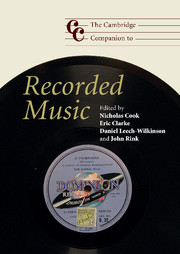Book contents
- Frontmatter
- Introduction
- Learning to live with recording
- A short take in praise of long takes
- 1 Performing for (and against) the microphone
- Producing a credible vocal
- ‘It could have happened’: The evolution of music construction
- 2 Recording practices and the role of the producer
- Still small voices
- Broadening horizons: ‘Performance’ in the studio
- 3 Getting sounds: The art of sound engineering
- Limitations and creativity in recording and performance
- Records and recordings in post-punk England, 1978–80
- 4 The politics of the recording studio: A case study from South Africa
- From Lanza to Lassus
- 5 From wind-up to iPod: Techno-cultures of listening
- A matter of circumstance: On experiencing recordings
- 6 Selling sounds: Recordings and the record business
- Revisiting concert life in the mid-century: The survival of acetate discs
- 7 The development of recording technologies
- Raiders of the lost archive
- The original cast recording of West Side Story
- 8 The recorded document: Interpretation and discography
- One man's approach to remastering
- Technology, the studio, music
- Reminder: A recording is not a performance
- 9 Methods for analysing recordings
- 10 Recordings and histories of performance style
- Recreating history: A clarinettist's retrospective
- 11 Going critical: Writing about recordings
- Something in the air
- Afterword: Recording: From reproduction to representation to remediation
- Notes
- Bibliography
- Discography
- Index
Still small voices
Published online by Cambridge University Press: 28 September 2011
- Frontmatter
- Introduction
- Learning to live with recording
- A short take in praise of long takes
- 1 Performing for (and against) the microphone
- Producing a credible vocal
- ‘It could have happened’: The evolution of music construction
- 2 Recording practices and the role of the producer
- Still small voices
- Broadening horizons: ‘Performance’ in the studio
- 3 Getting sounds: The art of sound engineering
- Limitations and creativity in recording and performance
- Records and recordings in post-punk England, 1978–80
- 4 The politics of the recording studio: A case study from South Africa
- From Lanza to Lassus
- 5 From wind-up to iPod: Techno-cultures of listening
- A matter of circumstance: On experiencing recordings
- 6 Selling sounds: Recordings and the record business
- Revisiting concert life in the mid-century: The survival of acetate discs
- 7 The development of recording technologies
- Raiders of the lost archive
- The original cast recording of West Side Story
- 8 The recorded document: Interpretation and discography
- One man's approach to remastering
- Technology, the studio, music
- Reminder: A recording is not a performance
- 9 Methods for analysing recordings
- 10 Recordings and histories of performance style
- Recreating history: A clarinettist's retrospective
- 11 Going critical: Writing about recordings
- Something in the air
- Afterword: Recording: From reproduction to representation to remediation
- Notes
- Bibliography
- Discography
- Index
Summary
Increasingly, listening to ‘historic’ performances on record presents exciting challenges to those making new recordings in the studio. Among their many purposes, recordings enable us to plot lineages of musical accomplishment and also to observe where musicians in the last century or so have sought to break away from established traditions. Histories of interpretation can now be traced compellingly through a judicious synthesis of biography and the source-evidence on record. Wrongly imagined histories can be righted. And yet the recent surge of musicological interest in recordings and the resulting scholarly output has barely registered on the radar of performers (as distinct from those who study performance), as a catalyst either to pursue models of enquiry into past interpretative values or to measure what these achievements count for in their own creative lives. The study of recordings by academics is rarely motivated by how it can inspire performers. Therefore the study of recordings by performers needs to be built on its own practical and cultural foundations where a close intertextual relationship can be established between the recording studios of yesterday and today.
If the post-war recording studio is deemed partly responsible for a perceived erosion of the ‘commitment at risk’ of the performer's ‘enactment of chosen meanings and values’ (as George Steiner ennobled the interpreter), the solution I offer below provides a chance for atonement: performers properly equipped with a broad and discriminating musical vocabulary from the past (as observers and possible re-activators of specific rhetorics, means of characterisation, hierarchies of elocution and nuance, etc.) can re-invent the ‘studio’ as a critical workshop for evaluating the ideals of previous generations and stimulating a practical re-appraisal of modern musical interpretative values. For history to impact creatively in this way, performers must conquer fears of past ‘greats’ as a yoke that stifles individuality and then wrestle with those elements which, however remotely, already inspire them.
- Type
- Chapter
- Information
- The Cambridge Companion to Recorded Music , pp. 54 - 58Publisher: Cambridge University PressPrint publication year: 2009



